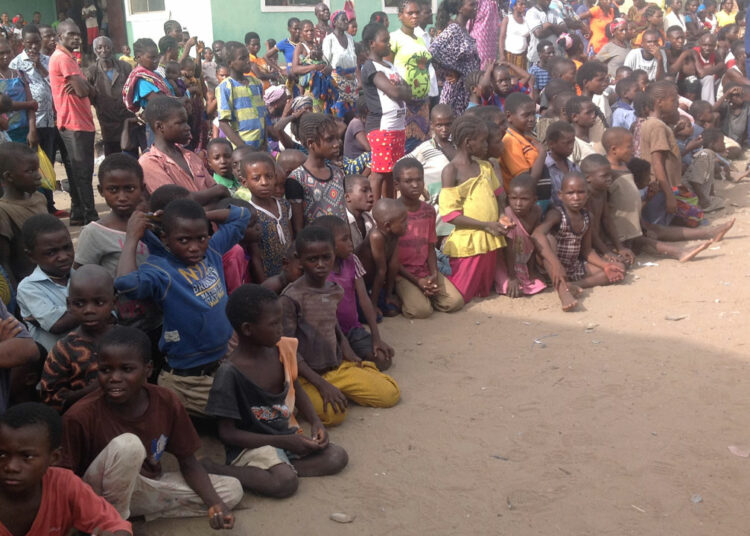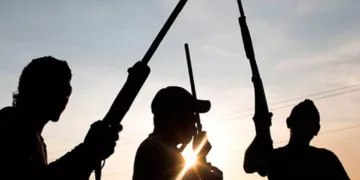In spite of federal and state laws protecting the rights of children and making their enrolment compulsory in some states, the number of out-of-school children in Nigeria keeps growing and, according to the latest statistics, has now reached 20 million.
An investigation by LEADERSHIP Weekend shows that the inability of federal and state governments to implement these laws and provide a safety net for children living in broken homes and are victims of child labour are some of the reasons the numbers keep rising.
Section 28 of the Child Rights Act prohibits the use of children for exploitative labour, while section 171 spells out the responsibilities of state governments. A number of states are however insisting they are doing all they can to protect these rights and educate many of these vulnerable children.
A senior member of staff of the Abia State Ministry of Education, who preferred anonymity, expressed dissatisfaction that “ the ugly negative development has continued up to this age.”
According to her, the government has provided enough encouragements such as conducive learning environment and free feeding for pupils and junior secondary school students to close the gap.
She, however, stated that a majority of the children, especially those below the age of 12, were brought into the state from some of the neighbouring states as house help.
She disclosed that the failure of the government to implement the Child Right Law, which has been passed by the state House of Assembly, is as a “result of red tape and bureaucracy.”
“I would say the government is yet to give it the attention it deserves. The stakeholders, which include traditional and religious leaders, civil society organisations and the security agencies, among others, are not yet involved.”
Similarly, a Kaduna State government official has said the state is implementing the Child Welfare and Protection Law as assented to by Governor Nasir El-Rufai after it was passed by the State House of Assembly in 2018.
An official who spoke on condition of anonymity said the Kaduna State government closed down some schools where children were molested and even took the culprits to court.
“Many rapists in Kaduna are cooling themselves in prison awaiting trial, but some have been convicted,” he said.
Commenting on out-of-school children, the official said: “You will recall that it is now an offence in Kaduna State if you fail to send your child to school because public primary schools are free and compulsory.”
Out -Of -School Children Litter A’Ibom Streets Despite Free Education Policy
In spite of the free and compulsory education policy introduced by the administration of former Governor Godswill Akpabio (2007 – 2015) and sustained by Governor Udom Emmanuel, out-of- children still litter most streets in Uyo metropolis, even during school hours, checks by our correspondent revealed.
Determined to ensure effective implementation of the policy, according to the permanent secretary in-charge of schools monitoring, Mr. Asuquo Selong Edem, said Governor Emmanuel had committed enough resources into ensuring “a functional, free and compulsory education policy.”
Towards effective restoration of sanity to the basic school system plagued by the malaise of cultism, petty crimes and intra-school violence that have combined to impinge negatively on the free education scheme, Edem said Emmanuel had since his assumption of office in 2015 committed enough resources into repositioning the basic school system “for proper teaching and learning.”
He said: “The governor has stated that the basic school system is very dear to his heart because of the children who are the future leaders, and that is why the security of the schools’ environment has been taken care of. In most schools in the capital, cases of cultism and violence have reduced because of perimeter fencing of some metropolitan schools as ordered by the governor.”
It was learnt that the provision of teaching and learning facilities and the recruitment of more teachers by government had further boosted the enrollment figures in schools across the 31 local government areas, but investigations by our Correspondent revealed high level apathy among children of poor homes.
Worse hit are orphans, children of single parents and the stigmatised children labelled child-witches and driven out of homes by mostly foster parents who accused them of bewitching and rendering them poor.
Most of them, who constitute the major percentage of the out-of – school children, LEADERSHIP investigations revealed, eke out their living through menial jobs and scavenging for scraps – condemned irons, plastic bottles, electronic wastes and scooping of decayed particles including animal dung, which they sell for little rewards to farmers, who usually use them as manure.
Often, they are seen at major dumpsites along the Uyo Village Road, which the state’s Waste Management Agency, chaired by Prince Akpan Ikim, has defied Governor Emmanuel’s Executive Order to relocate.
“I can’t go to school because I don’t have anyone to cater for me. I was driven out of the house by my step-mother, who took me to a prophet to deliver me of the spirit of witchcraft. He (the prophet) used to tie me down and flog me so the spirit of witchcraft could leave me. One day, when I could not bear it again, I ran away to Uyo. I am from Esit Eket LGA,” one of them, Asuquo Inyang, 12, told our correspondent.
Over 159,000 Out Of School Children In Benue
In Benue State, there are 159,444 children who are mainly living in Internally Displaced Persons (IDP) camps across the state.
Our correspondent who visited some of the IDP camps sheltering the children observed that most of them, especially those who lost parents to the farmers/herders crise, looked dejected and hopeless as all of them were not attending school.
One of the children at the camp located along Joseph Sarwuan Tarka University Makurdi, Abigail Audu, 12, told our correspondent that her grandparents could not afford to enroll her in school because they had lost all they had, including the father of Abigail due to a violent attack in Bakin Korta in Guma Local Government Area.
She said she had stayed in the camp for over five years with her grandparents, her biological mother, and nine of her siblings who, she said, were not going to school.
When approached by our correspondent, Abigail’s grandfather Audu, broke into tears.
“I am speechless, I don’t know what to talk about,” he said, adding that “staying alive to hear the cry of my children when they were being butchered by the herdsmen and not being able to do anything alone is traumatising.
“I don’t know why God kept me alive to watch all these. I am overwhelmed in sadness; for me life is meaningless. I am pained watching these children grow without proper parental attention. Our staying here is at the mercy of philanthropists and public-spirited individuals. But all I can say is God knows why?”
Out-of-School Children Increases in Kogi Despite Government’s Actions
It has become a normal thing to see school age children roaming the streets and sometimes hawking different commodities including kola nuts, groundnuts and so on in the street of Kogi State.
Most children on the streets of Lokoja, the capital of Kogi State, had previously attended school but they stopped going due to one reason or the other.
LEADERSHIP Weekend visited different locations in the Kogi State capital, including Karaworo area where Abibat Sanni, a 16-year-old girl who hails from Kotonkarfe, said she stopped attending school when she was in JSS 3 as a result of her parent’s inability to finance her education.
She explained that she feels sad anytime she sees her classmates who are already in SS1 in the school.
“Apart from helping my mother with house chores, I do not do anything apart from that. I will be happy and grateful if I see anybody that decides to sponsor my education,” she said.
Among the numerous out-of-school children around Kabawa area are Abdulkadir Aminat and Abdullahi Salamat, both 15-year-old twins, who dropped out of Holy Trinity UBE School in Lokoja. Tables turned when their parents could no longer sponsor their schooling, leaving them at home after finishing Junior Secondary School. The twins resorted to learning fashion design (tailoring).
According to their mother, Rekiat Ismail, “We are from Bida in Niger State and we came to Lokoja in search of greener pastures but their education could not continue. I also have a younger one who is ten years old and she can’t go to school, too”.
Although the public schools in Kogi State are standard and affordable, some people who are the poorest of the poor still cannot afford to enroll their children in such government-owned schools.
In Katsina State, a lot of out-of-school children are seen across the major streets during school hours begging for food and money.
One of them, Manir Isah, was seen among a group of children moving around Katsina town. He told our correspondent that he and his mother left their village months ago to settle in an uncompleted building in Katsina.
He added that his father is late and the mother could not afford their feeding, instead she sends them to beg for food and money every day.
“While in our village in the Batsari area, we attended Western and Islamic schools, but since we came here, we only go to Islamic school from time to time.”
Aisha Mamma, about 14, was moving around with her mother on the streets soliciting for aid. She said she was forced out of school because her parents could not afford their upkeep much less sponsor their education.
She urged the government to help them with houses, food and money to pick up their lives and start a new life again after they were displaced from their community.
Out Of School, Orphaned Children In Calabar
In Calabar, the Cross River State capital, one of the out of school children who spoke to LEADERSHIP Weekend included 14 year old Favour Anthony Asuquo, an indigene of Akpabuyo LGA of Cross River State.
Fsvour said he left school not because he had no father to sponsor him but because he ran away from home due to his father’s beatings.
“My father got married to another woman and my mother ran away and left my father and I.
He said that his father, an Indigene of Akpabuyo LGA of Cross got married to a new wife who probably influenced his father to maltreat him, a situation that warranted his escape from home to join other street kids.
On how he survives, Favour said he lives by begging, adding that
he and his friends sleep at the Cross River State Cultural Centre Complex or in front of people’s shops whenever the shop owners close their shops and retire home at close of work.
Favour, who claimed he dropped out from school in JSS1 class said he cannot return home because he doesn’t want his father to bully him any longer.
12-year-old Godswill Godstime told LEADERSHIP Weekend that he dropped out of school in Primary 3 when he was a pupil of Afokang primary school, Calabar South LGA of Cross River State, due to the death of his mother.
He said he survives by picking scraps of metal to sell to merchants and stated that nobody pursued him from home except for the fact that he ran away from home because his father was a disciplinarian who never spared the cane at the slightest provocation.
He said that aside picking of scraps, he also survives by begging along the streets of Mary Slessor Avenue and the state Cultural Centre Complex.
We Want To Attend School – Ridwan, Awwalu
Two out-of-school children, Ridwan and Awwalu told LEADERSHIP Weekend in Ilorin, Kwara State, that they wanted to be enrolled in school.
The 13-year-old Ridwan of Dada area, Ilorin, Kwara State has not been enrolled in school by his parents. He said he’s serving as an apprentice under his biological father who is a vulcaniser.
Awwalu, also 13, from Borno State was put under the care of an Islamic scholar in Ilorin, Kwara State. He said he always roams about after the Arabic school hours to scavenge or beg for alms. He also expressed the desire to go to school.
Gombe, like other northern states, has high number of out of school children.
A survey by our correspondent revealed that some of the barriers to children’s enrolment in schools can be linked to both customary and financial factors.
LEADERSHIP Weekend gathered that many of the out of school children are sent to work on farms to earn wages and support their parents.
This practice of using children for farm labour is known as ‘Barema’ and girls are mostly used for this practice which some activists say exposes them to exploitation among other forms of abuse.
In an interview with LEADERSHIP Weekend, some of the girls, Iklima Ahmad from Lawanti village of Akko local government, and Sara Adams, from Kwami local government, decried the practice.
They said the engagement of girls for farm labour had become rampant in the state, pointing out that the practice stops many of the girls from going to school.
Also, executive director of a child rights group known as Advocacy for Children’s Rights Initiative, Barrister Martha Daniel attributed the problem of out-of-school children to usage of the children for farm labour.
“As a result of that, girls are being violated; they are not going to school, and their education is suffering setbacks. That is ‘Barema’ in summary,” she stated.
Other respondents point to both financial incapacity and lack of interest on the side of the parents to enroll their wards in school.
“I spend early part of my day roaming around with my colleagues in search of what to eat. We usually follow people that hawk ‘masa,’ a corn delicacy, who share to us after good Samaritans paid for the ‘masa.’
“At times, we hang around ‘mai kose’ (beans cake seller) to hustle for left overs of kose and akamu (pap) to get something to eat.
“Often times, people engage us to work on their farm and give us food or a token before we returne home for studies in the evening.”
This is the narration of nine-year-old Nura Maigadi, an itinerant Islamic student brought from Funtua, Katsina state, to Sokoto about two years ago, in search of Islamic knowledge but has to toil for his survival at a tender age.
The plight of Nura Maigadi is similar to many out-of-school children on the streets who told our correspondent they craved for the opportunity to combine western and religious education.
Nura, who resides at Arkilla area with his tutor alongside other pupils, confessed that he admired and would have wished to attend formal schools, smartly dressed in uniform, but his disabled father could not afford to sponsor him.
Out-of-school children In Osun State Despite Free Education
Despite the age-long policy of free education at elementary schools in the South West and currently in operation at secondary school level, a sizeable number of children are still out of school in Osun State.
A larger percentage of these out-of-school children are domiciled in Hausa communities across the state and in the rural communities.
A nine-year-old Aminat from Kano State, who spoke with LEADERSHIP Weekend in Osogbo, the state capital, said though her parents are alive and doing well, they never introduced her to formal education.
Aminat, who lives with her parents, said she had not been introduced to a trade but was being groomed for marriage.
Also, Hakeeb, who is saddled with the responsibility of directing his blind father to beg for arms, said through an interpreter that nobody will take responsibility for her domestic needs in school.
Asked what his life ambition is, the eight-year-old boy said he would learn a trade when opportunity comes, adding that currently, there was no way he could leave his father to fend for himself.
Ruth Mensa, an 11-year-old girl serving as a house-help, attributed her predicament to the death of her mother. She however expressed optimism that her master will keep the promise of sending her to school.
Bauchi Out-of-School Children Sleep In Uncompleted Buildings
Isah Ahmed,13, said he has been moving from one uncompleted building to another in Bauchi to find a place to sleep in.
He said his parents, who are based in Jigawa, sent him to Bauchi to learn how to memorise the Qur’an but his teacher could not provide him with a space to sleep at night.
He said he lives on scavenging and house-to-house begging.
“Sometimes I do some menial chores for women and household owners like sweeping, fetching water and laundry to get the money I can use to take of myself.
“My parents are in Jigawa. They don’t send anything to me. I was left to myself,” he said.
Another boy, Ahmad Ibrahim, 14, said he was not enrolled into school because his parents cannot afford to pay his school fees.
He added that his sisters and brothers back home in Zamfara are not going to school either.
“My parents cannot afford to pay for my school fees which is why they left me roaming the streets. It has been a while since I found my way to Bauchi,” he said.





